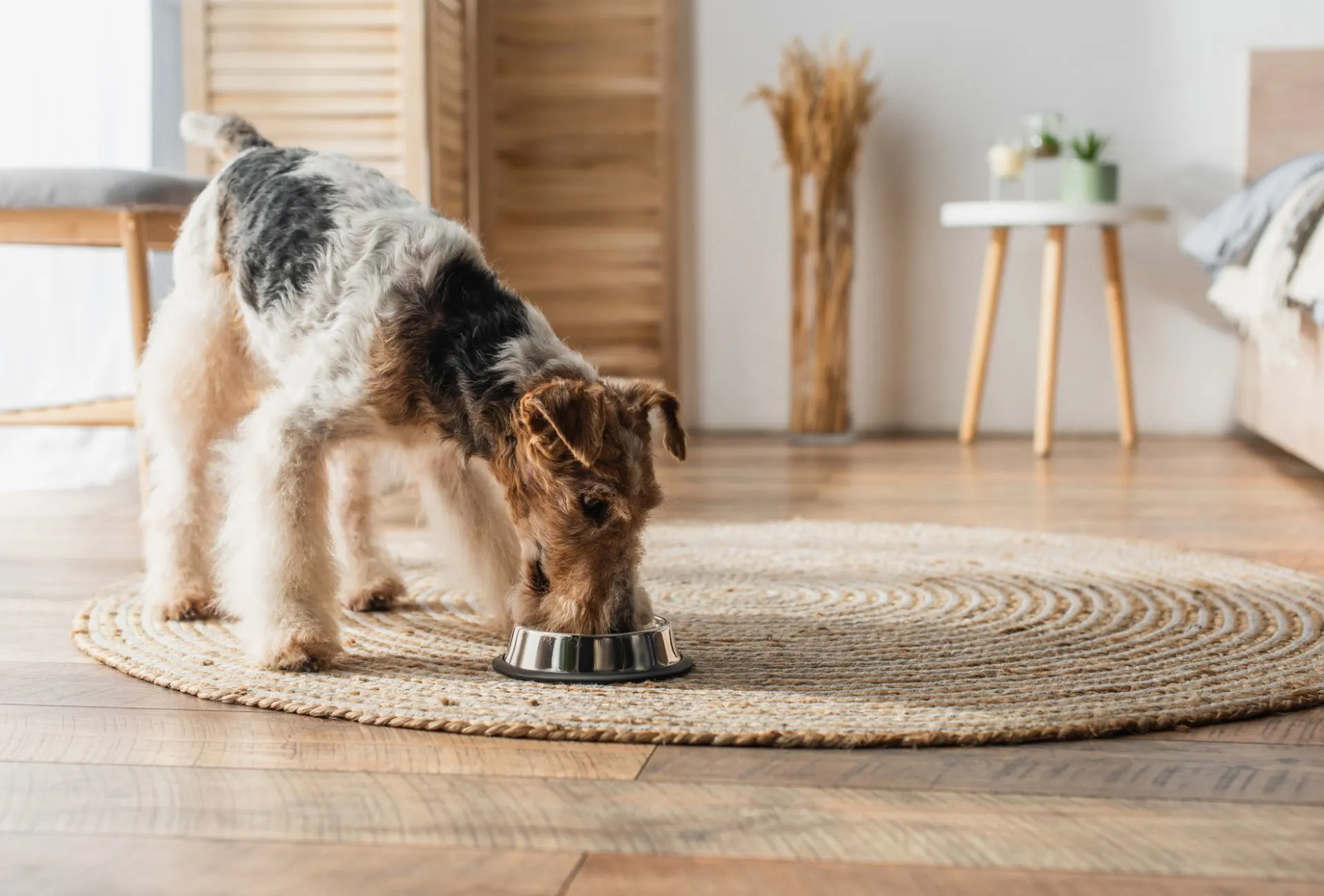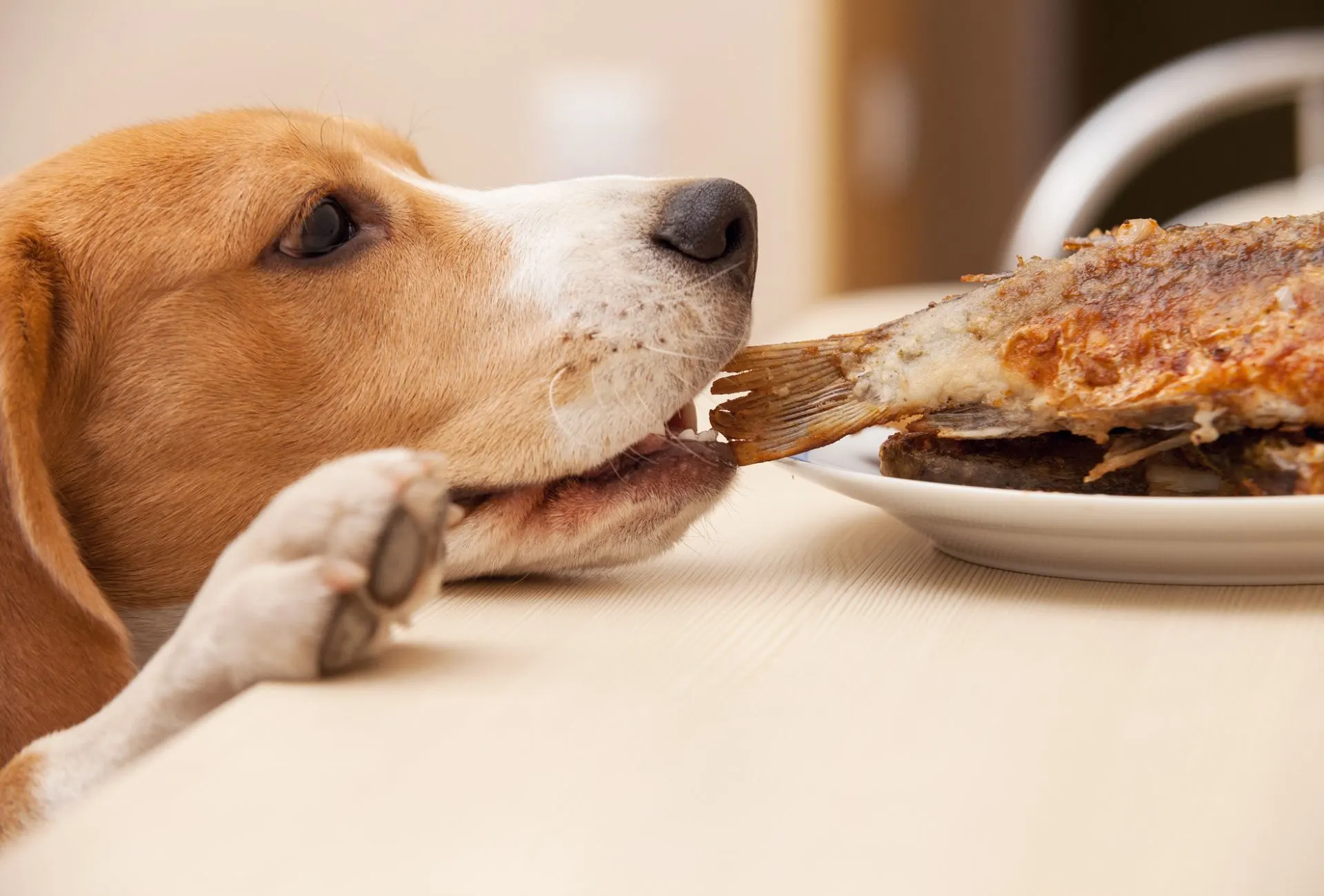[ad_1]
Whenever your dog devours his kibble with enthusiasm and a speed that would put competitive eaters to shame, it’s natural to wonder whether your dog would ever stop eating.
What would happen if you put a huge bag of dog food in front of him?
Would he gobble up the whole thing or is there a mechanism to stop him from overeating?
Just like humans, dogs have a natural body mechanism that tells them when they are full and need to stop eating.
However, many dogs would go beyond that sensation if given the opportunity which could lead to serious health complications.
Beyond meal times, many dogs seem like they are hungry all the time, often requesting treats persistently.
Are dogs being notoriously underfed or is there something else behind this insatiable hunger?
On the other hand, how should handle a dog that is overeating and never satisfied? Let’s answer all these questions!
A Dog’s Eating Behavior
When it comes to food, every dog has a slightly different relationship towards it but at the core, it’s influenced by a combination of natural instincts, learned behaviors, and external factors.
Even after thousands of years of domestication, a dog’s behavior and instincts still carry traces of their wild ancestors.
In the wild, wolves are opportunistic hunters and scavengers who live with a strong food scarcity mindset.
This means that they tend to consume very large meals after a successful hunt, as they cannot be certain when their next meal will be.

Wolves consume up to 10 kg of meat during initial feeding bouts and then rest in close proximity to the carcass for several hours before feeding again.
Consuming as much food as possible when it’s available is ingrained in your dog’s DNA.
In a number of studies, dogs have shown a tendency to consume food in excess of their energy requirements. When fed ad libitum and given a choice of dietary components, dogs did regulate their protein and overall energy intake, but the regulated energy level was around twice the mean daily requirement. This implies that dogs have inherited satiety mechanisms that are the result of adaptation to a “feast or famine” food availability in wolves.
Geometric analysis of macronutrient selection in breeds of the domestic dog
Furthermore, smell plays a significant role in how your dog perceives food.
The smell of food greatly influences the flavor and how much your dog will enjoy consuming it.
It doesn’t just make the food tasty, it can also make it irresistible.
That’s why dogs tend to prefer more aromatic foods and why many pet food companies add smelly additives to their formula.
How much your dog eats can be influenced by various factors, both internal and external.
Some dogs simply have a stronger appetite than others.
How hungry your dog feels can be influenced by breed, age, health, and individual temperament.
A dog’s eating environment is also important and if there are stressors or distractions around, your dog may be inclined to less or more quickly.
This can also happen when there are other animals or people close to your dog’s bowl during mealtime.
If your dog’s appetite has recently changed, this can point to an underlying medical issue.
Do Dogs Stop Eating When They Are Full?
Just like humans, dogs have the ability to feel full which signals their body to stop eating.
However, that doesn’t mean that their satiety point is the same as ours.
Satiety is a psycho-biological process that involves communication between the digestive system, hormones, and the brain.
As the digestion process unfolds, the body sends signals to the brain to regulate food intake.
The main hormones involved are called leptin and ghrelin.
Ghrelin is often referred to as the “hunger hormone” since it stimulates appetite.
Leptin is secreted by fat cells and informs the brain when the body has received sufficient nutrients.
Satiety is reached long before the food is digested or absorbed.
As I have mentioned above, dogs evolved from an animal that is used to gobble up large prey whenever it has the chance to.
This could mean that they literally fill up their whole stomach to the brim if given the chance to.
Do Dogs Ever Stop Feeling Hungry?
Dogs’ appetites feel insatiable at times, leading owners to wonder if there is anything they can do to satisfy their hunger.
Instinctually, dogs are always searching for food opportunities and want to make sure that nothing is missed.
This does not mean that your dog is constantly starving or even hungry, it just means that he wants to eat, much like humans eat out of stress or boredom.
If your dog’s hunger seems excessive, there might be an underlying medical problem or environmental stimuli.
It can also mean that the food you are feeding your dog is not providing him with enough nutrients.
Naturally, dogs that exercise or work most of the day will have a much bigger appetite than couch potatoes.
There are some breeds that are known to be notoriously hungry and more likely to beg for food.
Among them are Labrador Retrievers, French Bulldogs, Pugs, Dachshunds and Beagles.
Remember that just because your dog is begging for food doesn’t necessarily mean that he needs it or should have it.
Begging is a learned behavior that your dog displays because he has been rewarded for begging in the past.
Overeating in Dogs
While dogs have natural mechanisms to regulate their food intake, there are instances where they may overeat.
Dogs that have experienced periods of food scarcity in the past may be more prone to overeating when food is readily available.
If the served food is extremely tasty, your dog might end up eating beyond his satiety point.
Boredom and stress are not only common factors for overeating in humans but also in dogs.

If there is some kind of rivalry in multi-pet households, this could also influence eating behavior.
Overeating isn’t only uncomfortable in the moment, it can also lead to many health issues.
Eating large quantities in a short time can strain a dog’s digestive system causing stomach upset, bloat, diarrhea, and vomiting.
Constant overeating can lead to permanent problems that influence a dog’s well-being and decrease lifespan.
Obesity is one of the biggest health problems in pets and can lead to diabetes, joint issues, heart disease, and other conditions.
The 2022 Pet Obesity Prevalence Survey showed an increase in overweight and obese dogs and cats, with 59% of dogs and 61% of cats classified as overweight or obese.
For dogs, this percentage increased from 56% in 2018 and 2017, and for cats a slight increase from 60%.
Consistent with previous surveys, many dog and cat owners failed to recognize excess weight or overweight body conditions in their pets.
If your dog tends to overeat a specific kind of food, it can lead to nutritional imbalances.
So to spare your dog this discomfort and possible trips to the emergency vet, we have to take some precautions.
In some cases, the problem lies in the owner simply overfeeding their dog.
Providing larger portions than needed consistently can lead to weight gain and obesity.
How to Keep Your Dog From Overeating
One of the best and easiest ways to prevent overeating in dogs is to limit your dog’s food portions.
Nearly every pet food company has feeding guidelines printed on their packaging and when in doubt, consult your veterinarian regarding meal portions.
This way you never have to wonder or worry if the amount of food your dog ate is too much.
Often the biggest culprit for overeating or obesity in canines is free feeding.
Free feeding allows your dog to consume a larger amount of food than their body actually needs while missing out on important training opportunities.
Establishing a consistent feeding schedule can help regulate your dog’s eating behavior.
Your dog knows when to expect food and their body has a chance to get accustomed to their meal portions.
Dogs thrive on routines so try to feed your dog at the same times each day.
Avoid leaving food out for your dog to prevent overeating and the consumption of spoiled food.
Instead, offer meals at specific times and clean up any uneaten food after a specific time period.
If your dog seems super hungry after his meal times and you have ensured you are feeding the correct amounts, it could point to nutrient-lacking food or other health conditions.
There are also some dogs who could always use a snack, however, those are also often the same dogs that end up being overweight due to well-meaning owners.
Never ever feed your dog table scraps as it can lead to begging, overeating, and digestive upset.
Healthy dog treats should be given in moderation and used primarily for training purposes or as occasional rewards.
If your dog overeats due to stress or boredom, these underlying issues must be addressed.
Engage in regular exercise and playtime and provide mental stimulation through toys and puzzles to combat some of that stress.
Feeding Considerations for Puppies and Senior Dogs
Now that you have gained a good understanding of eating behaviors in dogs, it’s crucial to recognize that different life stages and health conditions can impact their dietary needs and eating habits.
Puppies are bundles of endless energy and their nutritional requirements are vastly different from adult dogs.
That’s why it’s important to feed specialized food for puppies and to opt for more frequent meals.
Many new owners have wondered about their puppy’s insatiable hunger and for good reason.
Puppies grow on average 20 times faster than adult dogs and require more daily calories.
They tend to have large appetites to meet those high nutritional needs.
As dogs age, their metabolism slows down and their bodies won’t need as much energy.
Senior dogs may experience dental issues and decreased appetite which in turn leads to a decreased interest in food.
This is a normal part of aging and can happen even to the biggest foodies.
Disclaimer: This blog post does not substitute veterinary attention and does not intend to do so. I am not a veterinarian or pet nutritionist. If your dog shows any sign of illness, call your vet.
[ad_2]
Source link
